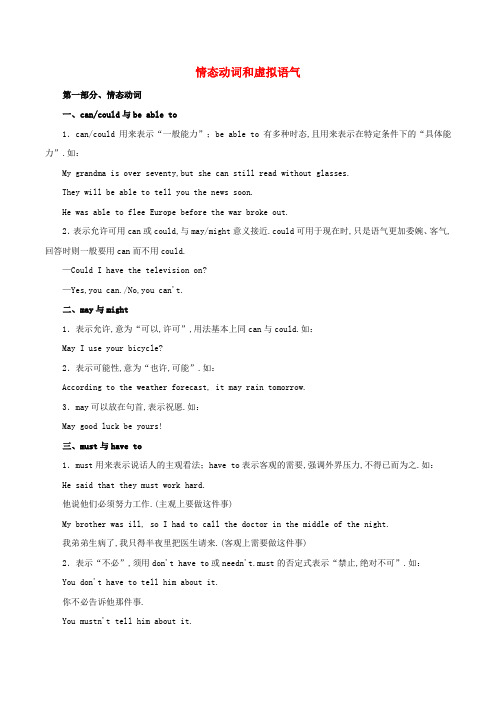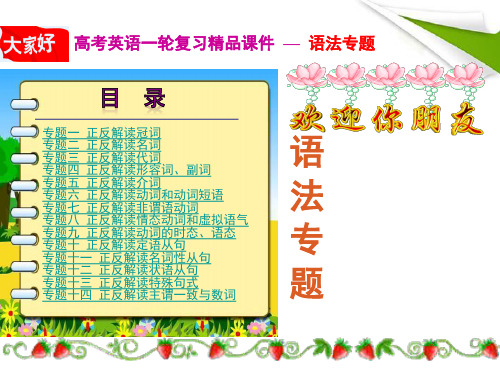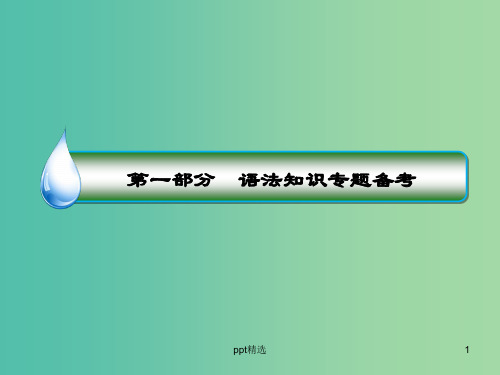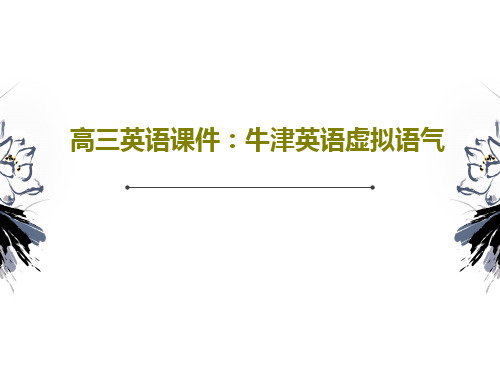高三英语二轮复习 专题一 语法 板块二 第三讲 情态动词和虚拟语气课件 牛津版
2020届高考英语一轮复习语法第二部分攻克重难动词第三讲情态动词和虚拟语气课件牛津译林版

—I really don't like James. 表示推测,意为“或 Why did you invite him? 许,可能”,通常用 —Don't worry. He might not e. 于肯定句和否定句中。 ——我真的不喜欢詹姆斯。 might比may语气弱。 你为什么邀请他?
——别担心。他或许不会来。
now. Just tell us whether you can undertake the task or not.现在我们 必须尽快采取行动。你仅仅告诉我 们你能否承担这项任务就行。
(needn't)或don't have to, 而不是用must not。
I have to go now, because my mother is in hospital.我现在不得不 走了,因为我母亲在住院。
I can't thank you too much for all
用于固定习语中:can't ... your help to my son while we were
too/enough (无论……也不过 away from home.
分;越……越好);can't but 我非常感谢你,在我们不在家时
为“可能”,用于否定句和 疑问句中。can比could语气 强。
He can't be our manager. He has
gone to Beijing. 他不可能是我们经理。他已经去 北京了。
表示惊异、怀疑、迷惑等态 度,常用于否定句和疑问句 中。
How can you treat me like that? 你怎么能那样对我?
4.(2018·全国卷Ⅱ)As a kid, I loved to watch cartoons, but no
高考英语二轮总复习 核心语法必备 专题一 谓语动词(动词的时态、语态、主谓一致、情态动词和虚拟语气)

cook, draw等, 常与well, easily,
这件衬衫不好洗。
smoothly等副词连用
open, close, lock, move, keep等动词常 The drawer won't lock.
与won't, can't, wouldn't 连用
这个抽屉锁不上。
重点一
重点二
重点三
重点四
意义 集体名词class, family, army, team, club, company, population, 单
一致 enemy, party, crew, audience, committee, government, majority, 复
原则 group等强调整体时谓语动词用单数, 指个体成员时谓语动词用 数
代词
单个的动词-ing形式、动词不定式或主语从句
重点一
重点二
重点三
重点四
原则
主语
谓语
由and连接的两个并列成分表示两个不同的概念
有生命的集体名词, 如people, police, cattle等 一些常用作复数或只有复数形式的名词, 如goods,
stairs,
arms等
复数
山脉、群岛、瀑布等以-s结尾的专有名词
重点三 主谓一致3原则
原则
主语
谓语
语法 单数
单数
一致 原则
复数
复数
就近 一致 原则
由or, either... or..., neither... nor...,
not only... but (also)..., not... but... 等连接
与最近的主语在单复数上 保持一致
高考英语二轮复习情态动词和虚拟语气考点讲解含解析

情态动词和虚拟语气第一部分、情态动词一、can/could与be able to1.can/could用来表示“一般能力”;be able to有多种时态,且用来表示在特定条件下的“具体能力”.如:My grandma is over seventy,but she can still read without glasses.They will be able to tell you the news soon.He was able to flee Europe before the war broke out.2.表示允许可用can或could,与may/might意义接近.could可用于现在时,只是语气更加委婉、客气,回答时则一般要用can而不用could.—Could I have the television on?—Yes,you can./No,you can't.二、may与might1.表示允许,意为“可以,许可”,用法基本上同can与could.如:May I use your bicycle?2.表示可能性,意为“也许,可能”.如:According to the weather forecast, it may rain tomorrow.3.may可以放在句首,表示祝愿.如:May good luck be yours!三、must与have to1.must用来表示说话人的主观看法;have to表示客观的需要,强调外界压力,不得已而为之.如:He said that they must work hard.他说他们必须努力工作.(主观上要做这件事)My brother was ill, so I had to call the doctor in the middle of the night.我弟弟生病了,我只得半夜里把医生请来.(客观上需要做这件事)2.表示“不必”,须用don't have to或needn't.must的否定式表示“禁止,绝对不可”.如:You don't have to tell him about it.你不必告诉他那件事.You mustn't tell him about it.你绝不能告诉他那件事.—Must we do it now?我们必须现在做吗?—No, you needn't.不,你们不必.四、shall1.用于第一、第三人称的疑问句中,用来征求对方的意见或请求指示.如:What shall he do next?他下一步干什么呢?2.用于第二、第三人称的陈述句中,表示说话人的意愿,有“命令、警告、允诺、威胁、强制”等意思.如:He shall stay in bed.他必须躺在床上.You shall have it back next week.下周一定还你.He says he won't go, but I say he shall.他说他不去,但我说他必须去.五、will与would1.will用于各种人称,表示“意志、意愿”或“决心”等.如:If you will keep your watch half an hour slow, it is hardly surprising that you are late for your appointments.如果你想要让你的表慢半个小时,你约会时迟到就不足为怪了.2.will表示习惯性的动作,有“总是,惯于”的含义.如:An Englishman will usually show you the way in the street.英国人通常是会在街上给你指路的.3.would可表示过去反复发生的动作.如:On Sundays he would get up early and go fishing.星期天他总是早起去钓鱼.六、should与ought to1.should表示“建议”或“劝告”,有“应该”之意.如:You should learn from each other.2.ought to表示根据某种义务或必要“应当”做某事.如:Everyone ought to obey the traffic regulations.3.should和ought to也可用来表示推测,意为“想必会……”.如:—When can I come for the photos? I need them tomorrow afternoon.—They should be ready by 1200.七、情态动词表示推测1.can用于肯定句中表示客观的可能性,意为“有时会”;用于疑问句中可以表示推测,意为“可能”,有时表示一种惊讶的语气;用于否定句中也可以表示推测,can't意为“不可能”,语气很强烈.It is usually warm in my hometown in March, but it can be rather cold sometimes.我的家乡在三月份通常很暖和,但有时候也会相当冷.Mr. Bush is on time for everything. How can it be that he was late for the meeting?布什先生做什么事情都很准时,他怎么可能开会迟到呢?—Let's visit Tom together, Stephen.—There's no need to do so. He can't be at home, because I saw him board the flight to Beijing this morning.——Stephen,咱们一起拜访汤姆吧.——没必要这样做.他一定不在家,因为今天早晨我看见他登上了飞往北京的航班.2.may/might用于肯定句中可以用来表示不十分肯定的推测,意为“有可能”;用于否定句中也可以表示推测,may not意为“可能不”,表示一种不太确定的语气.The traffic is heavy these days. I might arrive a bit late, so could you save me a place?这些天交通很繁忙,我可能会来晚一点,请你帮我保留个位置好吗?3.must表示推测时只能用于肯定句中,意为“一定,必定”,表示十分肯定的语气(在疑问句中或否定句中要用can/could).—It's the office! So you must know eating is not allowed here.—Oh, sorry.——这是办公室!所以你一定知道这里不许吃东西.——噢,对不起.4.should用来表示推测时意为“应该”,即含有“按道理来说应当如此”的意思.There shouldn't be any difficulty about passing the road test since you have practiced a lotin the driving school.因为你在驾校训练了这么多,通过路考应该没什么困难.八、“情态动词+have done”结构1.should/ought to+have done,表示“过去本应该做而(实际)没有做的事情”,含有责备或遗憾的语气,意为“本应该……”.其否定形式为“should not/ought not to have+done”,表示某种行为本不该发生但实际上发生了.I shouldn't have watched that movie—it'll give me horrible dreams.我本不应该看那部电影——它会令我做噩梦.You ought to have come to the party yesterday, but why didn't you come?昨天你本来应该参加聚会的,可是你为什么不来?2.must+have done,用于肯定句,表示“过去一定做过某事”,表示一种很有把握的推测.注意,对过去发生的情况的否定推测常用“can't/couldn't+have done”表示.—Ye Shiwen won two gold medals in London Olympic Games.—She must have gone through tough training.——叶诗文在伦敦奥运会获得了两枚金牌.——她肯定受到严格的训练.—Do you know where David is? I couldn't find him anywhere.—Well. He can't have gone far—his coat's still here.——你知道大卫在哪里吗?我到处找不到他.——大卫的上衣还在这里,因此他肯定没走远.3.needn't+have done,表示“过去没有必要做某事,但实际上做了某事”.Mark needn't have hurried. After driving at top speed, he arrived half an hour early.马克本没必要那么匆忙.他以最快速度开车,结果早到了半个小时.4.may/might+have done,表示对过去情况的一种不太有把握的可能性的推测,表示“可能已做了某事……”,否定句表示“可能还没有……”.Sorry, I'm late. I might have turned off the alarm clock and gone back to sleep again.对不起,我迟到了.我可能把闹钟关掉后又睡着了.5.could+have done表示“过去本来可以做某事,但实际上没有做”;can/could+have done表示“过去可能做了某件事”.I could have saved the poor rabbit, but I didn't have the right drugs with me at that moment.我本来可以拯救那只可怜的兔子的,可是我当时没有合适的药品.第二部分、虚拟语气一、虚拟语气在虚拟条件句中的用法1.在具体运用中,条件从句中有时可省略if而采用倒装结构.如:Had it not been for your help, we wouldn't have achieved so much.2.介词without/but for、连词but、副词otherwise常用来表示某种假设条件.如:I wouldn't have made such rapid progress without your help.3.有时候从句动作和主句动作发生的时间不一致,这时谓语动词的形式要根据各自的时间来调整.如:If the weather had been more favourable, the crops would be growing still better.二、“should+动词原形”表示的虚拟语气这一类型常见词有“一坚持(insist)、二命令(order, command)、三建议(advise, suggest, propose)、四要求(request, require, demand, desire)”.以上词及其派生名词所接的名词性从句都使用“(should +)动词原形”的虚拟语气.①Jane's pale face suggested that she was ill, and her mother suggested that she(should) havea medical examination.简苍白的脸色表明她病了,她母亲建议她去检查身体.②She insisted that the man had stolen her car and that he(should) be sent to prison.她坚持说那个男人偷了她的车,并坚决要求他坐牢.三、特殊句式中的虚拟语气If only/It's (high) time (that)...wish/would rather/as if等固定句式要求用相应的虚拟语气表达形式.①I wish I could fly.真希望我能飞.②I would rather you came tomorrow.我宁愿你明天来.③If only I had taken your advice!要是听从了你的建议该多好啊!高频考点一、考查情态动词例1.(2018·北京卷)In today’s information age, the loss of data _________ cause serious problems for a company.A. needB. shouldC. canD. must【答案】C【解析】考查情态动词.句意:在今天的信息时代,数据的丢失有时会对一个公司造成严重的问题.数据丢失造成严重问题是客观上会发生的情况,即“客观可能性”,故该空应用情态动词can.C选项正确.其余情态动词均没有该用法.need需要;should应该,竟然;must必须,肯定.【变式探究】—Can’t you stay a little longer?—It’s getting late. I reall y _____go now, My daughter is home alone.A .mayB .canC . mustD .dare【答案】C【解析】句意:——你不能再多待会儿吗?——很晚了,我必须得走了.我女儿一个人在家.A. may可能,可以,也许;B. can能,会;C. must必须,必然要,必定会;D. dare敢,胆敢.结合句意,故选C.【变式探究】________ I have a word with you? It won’t take long.A. CanB. MustC. ShallD. Should【答案】A【解析】本题考察的是情态动词基本意义辨析.Can能够,可能;must必须,一定;非得;shall将要;should应该;句意:我可以和你谈谈吗?不会花很多时间的.根据句意可知本题使用can I…?表示询问对方是否允许.如:Can I use your dictionary?我可以使用你的字典吗?故A正确.高频考点二、考查情态动词的用法例2. (2018·天津卷) I can't find my purse. I___________ it in the supermarket yesterday, but I'm not sure.A. should leaveB. must have leftC. might leaveD. could have left【答案】D【解析】考查情态动词表推测.句意:我不能找到我的钱包了,昨天我有可能把它落到超市了,但我不确定.根据句中时间状语yesterday可知,是对过去事情的推测,故用情态动词+ have done,再根据后句but I’m not sure.可知,此推测为不能肯定的推测,故用情态动词could,表示“可能”.故选D.【变式探究】(2017•天津)My room is a mess, but I __________clean it before I go out tonight.I can do it in the morning.A. daren’tB. shouldn’tC. needn’tD. mustn’t【答案】C【解析】句意:我的房间很乱,但是在今晚我出去之前不需要打扫,我可以明天早晨再打扫.A.不敢;B.不应该;C不需要;D.不许.根据句意,故选C.【变式探究】Why didn't you tell me about your trouble last week?If you ________(tell)me,I could have helped.【答案】had told【解析】句意:上个星期你为什么不告诉我你的麻烦事?如果你告诉我了,我就能帮你.根据句意和相关信息判断,条件句表示与过去事实相反的假设,此时从句用过去完成时,主句谓语用“情态动词+have done”形式.【变式探究】I ______ have worried before I came to the new school, for my classmates here are very friendly to me.A. mightn’tB. mustn’tC. needn’tD. couldn’t【答案】C【解析】句意:我来新学校之前本没有必要担心,因为在这里我的同学对我非常友好.needn’t have done本没有必要做某事,表示实际上已经做了某事.根据句意可知选C.高频考点三、考查虚拟语气例3.(2019·天津卷)The workers were not better organized, otherwise they ________ the task in half the time.A.accomplished B.had accomplishedC.would accomplish D.would have accomplished【答案】D【解析】考查虚拟语气.句意:工人们没有被组织好,否则的话他们会用那一半的时间完成任务的.此处otherwise表达了一种含蓄虚拟;otherwise前的内容所述的是过去的事实,相当于if引导的条件状语从句“If the workers had been better organized”,因此后半部分应用“主语+would have done sth.”的结构.故选D.【举一反三】【2018·江苏】It’s strange that he _______have taken the books without the owner’s permission.A. wouldB. shouldC. couldD. might【答案】B【解析】考查虚拟语气.句意:真奇怪,他竟然没有主人的允许就拿走了这些书.在句型”It is important/necessary/strange/impossible/natural that...”中,其中由that引导的主语从句通常用“should+动词原形”这样的虚拟语气,其中的should可以省略.故选B.【变式探究】(2017·北京)If the new safety system _______ to use, the accident would never have happened.A. had been putB. were putC. should be putD. would be put【答案】A【解析】句意:如果这个新的安全系统被投入使用过的话,这个事故就不会发生了.根据主句确定是对过去情况的虚拟,所以从句谓语用had done形式,此外根据句意可知是被动,用被动语态,故A项是正确的.【变式探究】________(have)the governments and scientists not worked together,AIDSrelated deaths would not have fallen since their highest in 2005.【答案】Had【解析】句意:如果政府和科学家不共同努力,与艾滋病相关的死亡就不会从2005年的最高点下降.这是一个省略了从属连词if的虚拟语气句,使用了倒装句式.根据主句的would not have fallen可知,这里是表示过去的虚拟语气,所以用had.【变式探究】Without his wartime experiences, Hemingway____ his famous novel A Farewell to Arms.A.didn’t writeB. hadn’t writtenC. wouldn’t w riteD. wouldn’t have written【答案】D【解析】句意:没有他战时的经验,海明威就不可能写出著名的小说永别了武器.根据without his wartime experience没有战时的经历,可知表示对于过去的否定猜测,故主句用would have done,因此选D 项.1.(2019·天津卷)The workers were not better organized, otherwise they ________ the task in half the time.A.accomplished B.had accomplishedC.would accomplish D.would have accomplished【答案】D【解析】考查虚拟语气.句意:工人们没有被组织好,否则的话他们会用那一半的时间完成任务的.此处otherwise表达了一种含蓄虚拟;otherwise前的内容所述的是过去的事实,相当于if引导的条件状语从句“If the workers had been better organized”,因此后半部分应用“主语+would have done sth.”的结构.故选D.2.(2019·江苏卷)What a pity! You missed the sightseeing, or we ________ a good time together.A.had B.will haveC.would have had D.had had【答案】C【解析】考查虚拟语气.句意:多么遗憾!你错过了这次游览.否则,我们就可以一起度过一段愉快的时光.根据关键词or可知,这里表示与过去的事实相反,谓语动词应用would/could/should/might+have done.1.【2018·江苏】 There is a good social life in the village, and I wish I _______ a second chance to become more involved.A. hadB. will haveC. would have hadD. have had【答案】A【解析】考查虚拟语气.句意:在这个村里有很好的社交生活,并且我希望我再有机会去更多的参与.本题考查wish引导的宾语从句,表示与现在事实相反的愿望,所以从句用一般过去时.故选A.2.【2018·江苏】It’s strange that he _______have taken the books without the owner’s permission.A. wouldB. shouldC. couldD. might【答案】B【解析】考查虚拟语气.句意:真奇怪,他竟然没有主人的允许就拿走了这些书.在句型”It isimport ant/necessary/strange/impossible/natural that...”中,其中由that引导的主语从句通常用“should+动词原形”这样的虚拟语气,其中的should可以省略.故选B.3.(2018·天津卷) I can't find my purse. I___________ it in the supermarket yesterday, but I'm not sure.A. should leaveB. must have leftC. might leaveD. could have left【答案】D【解析】考查情态动词表推测.句意:我不能找到我的钱包了,昨天我有可能把它落到超市了,但我不确定.根据句中时间状语yesterday可知,是对过去事情的推测,故用情态动词+ have done,再根据后句but I’m not sure.可知,此推测为不能肯定的推测,故用情态动词could,表示“可能”.故选D.4.(2018·北京卷)In today’s information age, the loss of data _________ cause serious problems for a company.A. needB. shouldC. canD. must【答案】C【解析】考查情态动词.句意:在今天的信息时代,数据的丢失有时会对一个公司造成严重的问题.数据丢失造成严重问题是客观上会发生的情况,即“客观可能性”,故该空应用情态动词can.C选项正确.其余情态动词均没有该用法.need需要;should应该,竟然;must必须,肯定.5.(2018·北京卷)They might have found a better hotel if they _________ a few more kilometers.A. droveB. would driveC. were to driveD. had driven【答案】D【解析】考查虚拟语气.句意:如果他们多开几公里的话,他们也许会找到一个更好的旅馆.由“they might have found a better hotel”可知,该句是表示对过去的虚拟.if ____ a few more kilometers是条件句部分,表示对过去的虚拟,条件句部分要用过去完成时态,故D选项正确.1.(2017·北京)Samuel, the tallest boy in our class, ______ easily reach the books on the top shelf.A. mustB. shouldC. canD. need【答案】C【解析】A. must 必须 B. should 应该 C. can 能 D. need 需要.句意:Samuel,我班最高的男生,能很轻松地够着书架顶上的书,此处需要一个表示能力的词,故用can,答案为C.2.(2017•天津)My room is a mess, but I __________clean it before I go out tonight. I can do it in the morning.A. daren’tB. shouldn’tC. needn’tD. mustn’t【答案】C【解析】句意:我的房间很乱,但是在今晚我出去之前不需要打扫,我可以明天早晨再打扫.A.不敢;B.不应该;C不需要;D.不许.根据句意,故选C.3.(2017•江苏) _______ not for the support of the teachers, the student could not overcome her difficulty.A. It wereB. Were itC. It wasD. Was it【答案】B【解析】考查虚拟语气和倒装.虚拟语气中,be动词统一用were;虚拟语气的省略形式主要是把if省略,同时把were/should/had提前,即Were /Should/ Had I...,故选B.句意:要不是老师们的支持,该生是无法克服她自己的困难的.4.(2017·江苏卷) ____________ not for the support of the teachers, the student could not overcome her difficulty.A. It wereB. Were itC. It wasD. Was it【答案】B【解析】考查虚拟语气的省略.虚拟语气中,be动词统一用were;虚拟语气的省略形式主要是把if省略,同时把were/should/had提前,即Were /Should/ Had I...,故选B.5.(2017•江苏) _______ not for the support of the teachers, the student could not overcomeher difficulty.A. It wereB. Were itC. It wasD. Was it【答案】B【解析】考查虚拟语气和倒装.虚拟语气中,be动词统一用were;虚拟语气的省略形式主要是把if省略,同时把were/should/had提前,即Were /Should/ Had I...,故选B.句意:要不是老师们的支持,该生是无法克服她自己的困难的.6.(2017·北京)If the new safety system _______ to use, the accident would never have happened.A. had been putB. were putC. should be putD. would be put【答案】A【解析】句意:如果这个新的安全系统被投入使用过的话,这个事故就不会发生了.根据主句确定是对过去情况的虚拟,所以从句谓语用had done形式,此外根据句意可知是被动,用被动语态,故A项是正确的.1.(2016·浙江,15)________(have)the governments and scientists not worked together,AIDSrelated deaths would not have fallen since their highest in 2005.【答案】Had【解析】句意:如果政府和科学家不共同努力,与艾滋病相关的死亡就不会从2005年的最高点下降.这是一个省略了从属连词if的虚拟语气句,使用了倒装句式.根据主句的would not have fallen可知,这里是表示过去的虚拟语气,所以用had.2.(2016·浙江,17)George can't ________(go)too far.His coffee is still warm.【答案】have gone【解析】句意:乔治不可能走得太远了.他的咖啡仍然是温的.can't have done是对过去的否定推测.3.(2016·北京,34)Why didn't you tell me about your trouble last week?If you ________(tell)me,I could have helped.【答案】had told【解析】句意:上个星期你为什么不告诉我你的麻烦事?如果你告诉我了,我就能帮你.根据句意和相关信息判断,条件句表示与过去事实相反的假设,此时从句用过去完成时,主句谓语用“情态动词+have done”形式.。
高考二轮复习:情态动词和虚拟语气课件(共45张PPT)

——I’m sorry. I ______ at you the other day.
——Forget it. I was a bit out of control myself. (江苏2008)
A. shouldn’t shout
B. shouldn’t have shouted
C. mustn’t shout
He said that they must work hard. My brother was ill, so I had to call the doctor in the middle of the night.
情态动词考点四: should 与ought to should 表示“应当,应该(表义务责任);竟然” ought to 表示“应当(口语中多用should)”
情态动词考点二: may与might may 表示“可以(问句中表示请求);可能,或许
(表推测);祝愿(用于倒装句中)” might 是may 的过去式。
May I use your bicycle? According to the weather forecast, it may/might rain tomorrow. May you succeed./May God be with you.
二轮复习:情态动词和虚拟语气
情态动词常见考点:
1. can/could 3. must/have to 5. Shall 7. used to 9. had better
2. may/might 4. should/ought to 6. will/would 8. dare/need 10. would rather
would 表示“意愿,请求等;过去反复发生的动作 或某种倾向”
高考英语二轮复习精品语法课件_专题8_情态动词和虚拟语气

专题八 │ 正面解读
• 4.shall/will/would
情态 动词 shall 意义 例句 备注
表示征询意见。Shall I help you?
用于第一、 第三人称 疑问句中。
表示说话人的 意愿,有“命 令,允诺,警 告,决心”等 意思。
情态动词 意义 can/coul d 能力 例句 ①I can see some birds flying in the sky. ②Could the girl 备注 could表示泛指过去的某一能力。 表示过去有能力并且成功地做了 某事,通常用was/were able to do,相当于managed to
must
ought to need dare
Used to
专题八 │ 考点荟萃
自主学习
情态动词的语法特征
• 1情态动词除ought to和used to外,后面 只能接不带to的不定式。 • 2情态动词没有人称,数的变化,will can dare 除外。 • 3情态动词“时态”的形式并不是区分时 间的主要标准。
(三) could have done指本来能做而 实际未做,表达遗憾的感情色彩.
You could at least have sent five cards. • 你本来可以至少寄去5张明信片的。 • (说明没有寄那么多)
•
专题八 │ 正面解读
• •
二、情态动词的其他用法 1.can, could, may, might
情态动词+have done表示对过去情况的推测
• (一)should /ought to have done本来应做而未做,表达遗憾 感情色彩
例1:I told Sally how to get there, but perhaps I ____for her.(NMET94) A. had to write it out B. must have written it out C. should have written it out D. ought to write it out 析:选 C。分析语境可知,口头上告知 Sally 如何去 那里是不够的,所以我本应书面告知,却有没书 面 告 知 之 , 显 得 应 使 用 should /ought to have written表示遗憾之情。
高考英语二轮复习 1-9 情态动词、虚拟语气语法课件

ppt精选
7
答案:didn't 解析:本题考查反意疑问句。句意:“去年 夏天,我在伦敦度过了两个星期。”“那么,在此期间你肯定参 观了英国博物馆,是不是?”must have done 结构在句中表示对 过去事情的推测,当句末有反意疑问的语气时,可分为两种情况: (1) 句 中 没 有 明 确 的 过 去 时 间 状 语 时 , 反 意 疑 问 句 结 构 为 “haven't/hasn't...”;(2)句中有明确的过去时间状语时,反意疑问 句 结 构 为 “didn't... ? ” 。 根 据 题 干 中 的 过 去 时 间 状 语 last summer 以及 during your stay 可知,反意疑问句的结构应用第二 种情况。
答案:can 解析:考查情态动词。句意:虽然你能在伦敦 买到便宜货,但是一般来说那不是一个买便宜东西的地方。情态 动词 can 表示理论上的可能性。
ppt精选
6
2 . (2014·重 庆 卷 )—I spent two weeks in London last summer.
—Then you must have visited the British Museum during your stay, ________ you?
ppt精选
8
3.(2014·重庆卷)I've ordered some pizza, so we ________ worry about cooking when we get home tired.
答案:needn't 解析:本题考查情态动词的基本用法。句意: 我已经要了一些比萨,因此当我们疲惫不堪地到家时,________ 担心做饭的事情。根据前一分句 I've ordered some pizza(我已经 要了一些比萨)可知已经准备好了吃的东西,所以没有必要 (needn't)担心做饭的事情。
高三英语二轮复习课件1-8情态动词与虚拟语气

)
第一章
语法
2.“should+动词原形”表示的虚拟语气
这一类型 常见词有 “一坚持(insist)、二命令(order,
command) 、 三 建 议 (advise, suggest, propose) 、 四 要 求 (request, require, demand, desire)”。以上词及其派生名词 所接的名词性从句都使用“(should)+动词原形”的虚拟语 气。 ①Jane's pale face suggested that she was ill, and her mother suggested that she(should) have a medical examination.
)
第一章
语法
二、情态动词+have+过去分词的用法
“情态动词+have+过去分词”结构被普遍认为是一 个难点,因为它们表示的意义各不相同,可谓错综复杂。 有些表示推测(表推测时,有的常用于肯定句,有的常用于 否定句、疑问句);有些表示责备等。
《 走 向 高 考 》 二 轮 专 题 复 习 · ( 英 语 通 用 版
《 走 向 高 考 》 二 轮 专 题 复 习 · 英 语 通 用 版
advice), you wouldn't have failed in the examination.
如果你听了我的建议,你就不会考试不及格了。 (2)有时主句和虚拟条件从句的动作发生的时间不一致, 此时,主句和从句的谓语动词要根据各自所指的不同时间 选择适当的动词形式。
第一章
语法
专题八
情态动词与虚拟语气
《 走 向 高 考 》 二 轮 专 题 复 习 · ( ) 英 语 通 用 版
高三英语二轮复习课件情态动词和虚拟语气(共65张PPT)(2)

新课标高三二轮 ·英语
第一部分 语法专题
◆(2016·浙江卷)George can't have gone too far. His coffee is still warm.
乔治不可能走得太远。因为他的咖啡还是热的呢。 ◆(陕西卷)The children must have got lost in the woods; otherwise, they would have been at the lakeside camp as scheduled. 孩子们一定在森林里迷路了;否则,他们会按照计划在 湖边露营。
(2)表示偏执,固执,意为“非得,偏要”。 ◆(辽宁卷)If you must go, at least wait until the storm is over. 如果你非要走,至少要等到暴风雨停了。 4. shall的用法 (1)用于第一、第三人称疑问句中,表示说话人征求对方的意 见或向对方请示。 ◆ Henry is waiting outside. Shall he come in, sir? 亨利正在门外等着,要他进来吗?
为“禁止”。 ◆(湖北卷)We must act quickly as possible now. Just tell us
whether you can undertake the task or not.
新课标高三二轮 ·英语
第一部分 语法专题
现在我们必须尽快采取行动。你就告诉我们你能否承担这项 任务。
_b__ro_u__g_h_t→__b_r_i_n_g__
新课标高三二轮 ·英语
第一部分 语法专题 考点二 情态动词+have done
must have done
对过去的推测
高三英语二轮复习 板块2 第3讲 情态动词和虚拟语气课件

高频考点 深化突破
考点一 情态动词的基本用法
考点诠释 对点演练
4.表必要性 (1)must do sth.表示“必须做某事”。 (2)needn’t/don’t have to 表示“不必”。 (2014· 高考重庆卷)I've ordered some pizza, so we needn't worry about cooking when we get home tired. 我已经点了一些比萨,所以当我们回到家感到很累的时候,不必再担心 做饭的问题。
高频考点 深化突破
考点一 情态动词的基本用法
考点诠释 对点演练
mustn’t 不表推测,而是表示禁止。 It’s said that there are plenty of hotels in that town.There shouldn ’t be any difficulty for you to find somewhere to stay. It is usually warm in my hometown in March, but it can be rather cold sometimes. —It’s the office! So you must know eating is not allowed here. —Oh, sorry.
高频考点 深化突破
考点一 情态动词的基本用法
考点诠释 对点演练
(7)shall 与第二、三人称连用,用于陈述句,表示命令、警告、允诺、威 胁;当宣布法律、规定时也常用 shall。 —The deadline is drawing, but I failed to challenge the task a third time. —Shall my brother have a try? (2015· 高考北京卷)—Can't you stay a little longer? —It's getting late.I really must go now.My daughter is home alone. ——你不能再多待会儿吗? ——很晚了,我必须得走了。我女儿一个人在家。
高三英语课件:牛津英语虚拟语气20页PPT

拉
60、生活的道路一旦选定,就要勇敢地 走到底 ,决不 回头。 ——左
高三英语课件:牛津英语虚拟语气
36、“不可能”这个字(法语是一个字 ),只 在愚人 的字典 中找得 到。--拿 破仑。 37、不要生气要争气,不要看破要突 破,不 要嫉妒 要欣赏 ,不要 托延要 积极, 不要心 动要行 动。 38、勤奋,机会,乐观是成功的三要 素。(注 意:传 统观念 认为勤 奋和机 会是成 功的要 素,但 是经过 统计学 和成功 人士的 分析得 出,乐 观是成 功的第 三要素 。
高考英语二轮复习课件(全国通用)06情态动词与虚拟语气

can可用于肯定句中,表示客观或理论上的可能性。
•He is confident a solutio分n考ca点n1be f不ou定n冠d.他词的确基信本会用找法到解决办法。
can, could ★★★
•An experienced teacher can make mistakes. 一位有经验的老师也会犯错。 表示请求或允许。在疑问句中,could可以代替can,语气更委婉,但回答时
dare既可作情态动词,也可作实义动词;作情态动词时,表示“敢,胆敢”, 后跟动词原形,常用于疑问句、否定句和条件句中。•I am so afraid that I dare not move.我吓得一动也不敢动。
ought to ★★★ ought to表示义务,意为“应该”,语气比should略重。•You ought not to be so selfish.你
不应该这么自私。
should和ought to表示推测,指合乎理想的情况或结果,意为“按说应该”。 •Try phoning Robert—he should be home by now.给罗伯特打个电话试试,他现在应该 到家了。[《朗文当代》]
分考点1 情态动词考的点基一本用情法态动词的用法
情态动词
用法及例句
表示义务,意为“必须”。must强调说话人的主观看法,have to则强调客观
需要;在回答带有must的问句时,否定式常用need not (needn't)或don't have to,
而不是用must not。•We must act as quickly as possible now. Just tell us whether
表示惊异、怀疑、迷惑等态度,常用于否定句和疑问句中。•How can you
- 1、下载文档前请自行甄别文档内容的完整性,平台不提供额外的编辑、内容补充、找答案等附加服务。
- 2、"仅部分预览"的文档,不可在线预览部分如存在完整性等问题,可反馈申请退款(可完整预览的文档不适用该条件!)。
- 3、如文档侵犯您的权益,请联系客服反馈,我们会尽快为您处理(人工客服工作时间:9:00-18:30)。
2.(2013·江西高考)When I was a child, I ________ watch TV
whenever I wanted to. A.should
B.could
C.must
D.need
解析:句意:当我还是个孩子的时候,我什么时候想
看电视就可以看。根据题干中的 whenever I wanted to
C.shall
D.may
解析:句意:你或许觉得所有的训练都是浪费时间,但是
我百分之百确定,你以后会为你这么做了而心存感激的。
由句中的 but 及后一分句中的 a hundred percent sure 可
知,此处表示语气不强烈的推测,故用 may。答案:D
2 . (2015·重 庆 高 考 )You________ be Carol. You haven ’ t
“必须”; shall 用于第一人称时表示“征求对方意
见”,此处语境不是两人对话,而是一个人的主观看法;
should 表示“应该”,故选 A 项。答案:A
2.(2012·上海高考)The new law states that people ________
人称表命令、威胁、警告、许诺。 答案:A
(1) 肯 定 句 : can 表 示 客 观 上 的 可 能 , 有 时 会 ; may/might/could 表示可能;must 表示一定;should/ought to 表示应该/按说应该
(2)否定句:can’t/couldn’t 表示不可能;may not/might not 表示可能不;shouldn’t/oughtn’t to 表示应该不会
(3)疑问句:can/could 表示惊讶、怀疑、不相信的态度
[点津] mustn’t 不表推测,而是表示禁止。
①Life is unpredictable; even the poorest might become the richest.(2014·江西高考)
生活是不可预料的,即使是最贫穷的人也可能成为最有钱 的人。
第三讲
情态动词和虚拟语气
情态动词的考查以基本用法为 主,表示推测和“情态动词+have done”的用法是近三年考查的热点, 情态动词的特殊用法是考查的难点。 虚拟语气主要是考查在虚拟条件句中的用法,在名词性从句 特别是在宾语从句中的用法也是近几年考查的重点。试题的 立意不偏不怪,但是有效信息越来越隐蔽,情景越来越生动、 真实,考查角度越来越细微化、综合化。
一、t was so noisy that we________ hear
ourselves speak.
A.couldn’t
B.shouldn’t
C.mustn’t
D.needn’t
解析:句意:这里如此吵闹以至于我们听不见自己讲话。
couldn’t“不能”;shouldn’t“不应该”;mustn’t“不 准”;needn’t“没有必要”。 答案:A
可知,此空应填 could,表示一般的能力,指想做就能
做到。
答案:B
3.(2012·全国卷Ⅱ)I’m going to Europe on vacation together
with John if I ________ find the money.
A.can
B.might
C.would
D.need
解析:句意:如果我能弄到钱,我就和约翰一起去欧
洲度假。结合前后部分的内容可知,此处表示的是能
力。故用 can“能,会”。
答案:A
(1)表示现在的能力:can,am/is/are able to (2)表示将来的能力:will be able to (3)表示过去的能力:could 表示过去的能力,不表示是否 成功地做了;was/were able to 表示过去有能力做而且成功地 做了 He couldn’t sleep, although he tried to, when he got on such a hunt for an idea until he had caught it.(2013·湖南高考) 尽管他想睡,但仍睡不着,(因为)当时他拼命想着一个主 意,一直到想出来为止他才睡去。
②Since nobody gave him any help, he must have done the research on his own.(2013·新课标全国卷Ⅱ)
既然没人给予他任何帮助,他一定是独自完成这项研究的。 ③There shouldn’t be any difficulty about passing the road test since you have practiced a lot in the driving school. 因为你在驾校训练了那么多,通过路考应该没什么困难。
changed a bit after all these years.
A.must
B.can
C.will
D.shall
解析:句意:你一定是卡萝尔。这么多年你一点都没有变
化。根据后文的“You haven’t changed a bit”可知,说话 者完全认出了卡萝尔,猜测的语气非常肯定,因此选择
must,must 用在肯定句中表示语气非常肯定的推测,意为 “一定,想必”。can 用在否定句中表示把握非常大的推 测;will 表意愿、倾向或临时决定做某事;shall 用于第二
三、表请求、建议、命令、允许、允诺、禁止、义务、责任
1.(2014·北京高考)________ I have a word with you? It
won’t take long.
A.Can
B.Must
C.Shall
D.Should
解析:句意:我可以和你谈谈吗?不会用太长时间。can
在这里表示许可,意为“可以”,符合语境。must 意为
二、表推测
1.(2015·陕西高考)You ________ feel all the training a waste of time, but I’m a hundred percent sure later you’ll be
grateful you did it.
A.should
B.need
